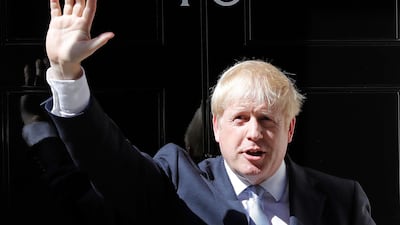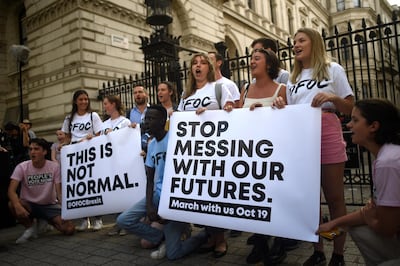British Prime Minister Boris Johnson was accused of a "constitutional outrage" on Wednesday, after securing permission from Queen Elizabeth to suspend Parliament for a month until mid-October, while his government works on Brexit.
Officials announced the current session of Parliament would end before September 12 to allow Mr Johnson to bring forward his own legislative programme five weeks later.
Critics and opponents immediately decried the duration of the break, which is the longest since 1945, claiming Downing Street was abusing the constitution to ensure Parliament could not derail its Brexit plans.
Sir John Major, one of Mr Johnson's Conservative predecessors, said he would take legal advice on a challenge in the courts, while other senior figures warned of a constitutional confrontation.
Michael Heseltine, the former deputy prime minister, accused the government of an "autocratic" move against opposition in Parliament.
"I find it unbelievable that any British government can suspend Parliament. This is a constitutional outrage," Mr Heseltine said.
An online petition opposing Mr Johnson's move to suspend parliament weeks before Brexit picked up traction on Wednesday, gathering more than one million signatures in a few hours.
On its website, the petition states "parliament must not be prorogued or dissolved unless and until" the departure of Britain from the European Union, scheduled for October 31, has been extended or cancelled.
As of midnight GMT, the petition had garnered 1,064,770 signatures.
Caught off guard after several days of gains, traders dumped sterling, pushing the pound sharply lower.
The currency fell briefly fell below $1.22 before a slight recovery and is down 10 cents since mid-March.
Bitter resistance to Mr Johnson's pledge to leave the EU by October 31 has grown in Parliament. Downing Street has accused rebel MPs of sabotaging its negotiating position with Brussels.
Since taking office in July, Mr Johnson has demanded a better deal from the EU than the withdrawal agreement secured by his predecessor, Theresa May.
He wrote to Conservative MPs to say that he needed to refocus the government's domestic agenda after the traditional party conference season.
Mr Johnson said the government needed to "bring forward a new, bold and ambitious domestic legislative agenda for the renewal of our country after Brexit".
US President Donald Trump tweeted his support for the move, saying the British leader was delivering on the demand for Brexit from the voters.
“Would be very hard for Jeremy Corbyn, leader of Britain’s Labour party, to seek a no-confidence vote against new Prime Minister Boris Johnson, especially in light of the fact that Boris is exactly what the UK has been looking for and will prove to be a great one. Love UK.”
Commons Speaker John Bercow issued an angry response to the announcement.
"It is blindingly obvious that the purpose of prorogation now would be to stop Parliament debating Brexit and performing its duty in shaping a course for the country,” Mr Bercow said.
“At this time, one of the most challenging periods in our nation's history, it is vital that our elected Parliament has its say."
Mr Corbyn accused the government of reckless abuse of the parliamentary rules.
"Boris Johnson’s attempt to suspend Parliament to avoid scrutiny of his plans for a reckless no-deal Brexit is an outrage and a threat to our democracy," Mr Corbyn said.
"Labour will work across Parliament to hold the government to account and prevent a disastrous no deal."
Nicola Sturgeon, First Minister of Scotland, said the move would "go down in history as a dark one indeed for UK democracy".
"Shutting down Parliament to force through a no-deal Brexit, which will do untold and lasting damage to the country against the wishes of MPs, is not democracy, it’s dictatorship," Ms Sturgeon said.
The leader of the Scottish National Party has said her devolved government would have to consider a new Scottish independence referendum in the event of a no-deal Brexit.
Ruth Davidson, leader of the Scottish Conservatives, is set to quit in protest against her party's plans, The Scottish Sun reported on Wednesday evening.
Ms Davidson, who campaigned against Brexit, steered the Conservatives to their best general election result in Scotland in 40 years in 2017.
But leading Brexiteers defended the move.
Jacob Rees-Mogg, Leader of the Commons, hit back at those who accused Mr Johnson of being undemocratic.
Mr Rees-Mogg reminded them that Parliament’s duty was to “respect the will of the voters” who had chosen to leave the EU.
After his earlier Privy Council meeting with the queen, Mr Rees-Mogg said the decision to suspend Parliament was "a completely normal procedure".
Opposition parties on Tuesday came together around a plan to push through a bill that would require the government to scrap its no-deal pledge and go back to Brussels to seek a second extension of the withdrawal date.
The meeting in Westminster marked the first time that all opposition political parties decided to combine forces on a single anti-Brexit initiative.
The request for the queen to suspend parliament and call a new session in October will still leave time for MPs to vote on a motion of no confidence if Mr Corbyn decides to start a clash next week.
Meanwhile, officials in Brussels privately welcomed Mr Johnson's tactics, which could make political space for a breakthrough at the European summit on October 17.
Mr Johnson wants the removal of provisions from Mrs May's agreement that would keep trade flowing uninterrupted across the Irish border.
His envoy to Europe, David Frost, is due to spend the coming week in Brussels trying to seal agreement on an alternative approach to Ireland.
But any possibility that Parliament could overturn Mr Johnson’s efforts reduces the incentive for the European side to make concessions.
The risk of a general election before Brexit has also risen and the Cabinet appeared to be gearing up for a snap poll.
Chancellor Sajid Javid called an early public spending review next week and is set to announce increases for schools, hospitals and police.



